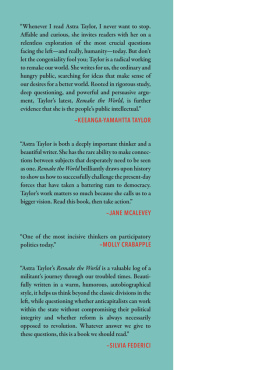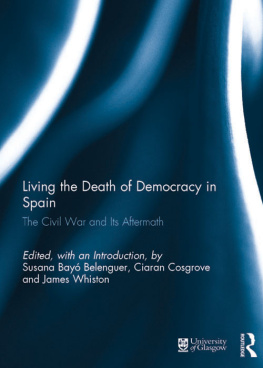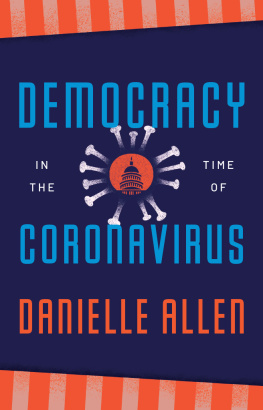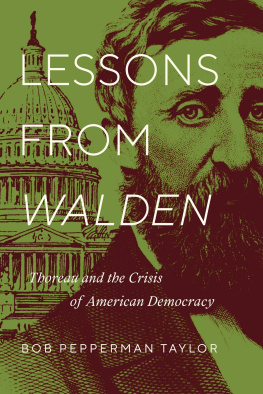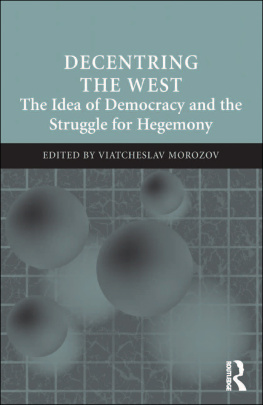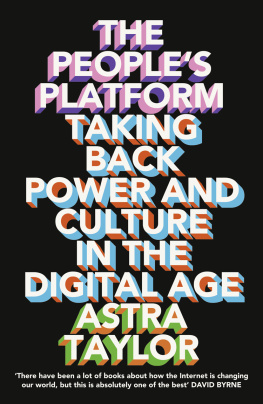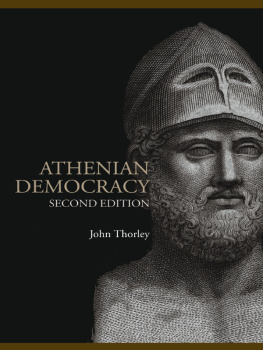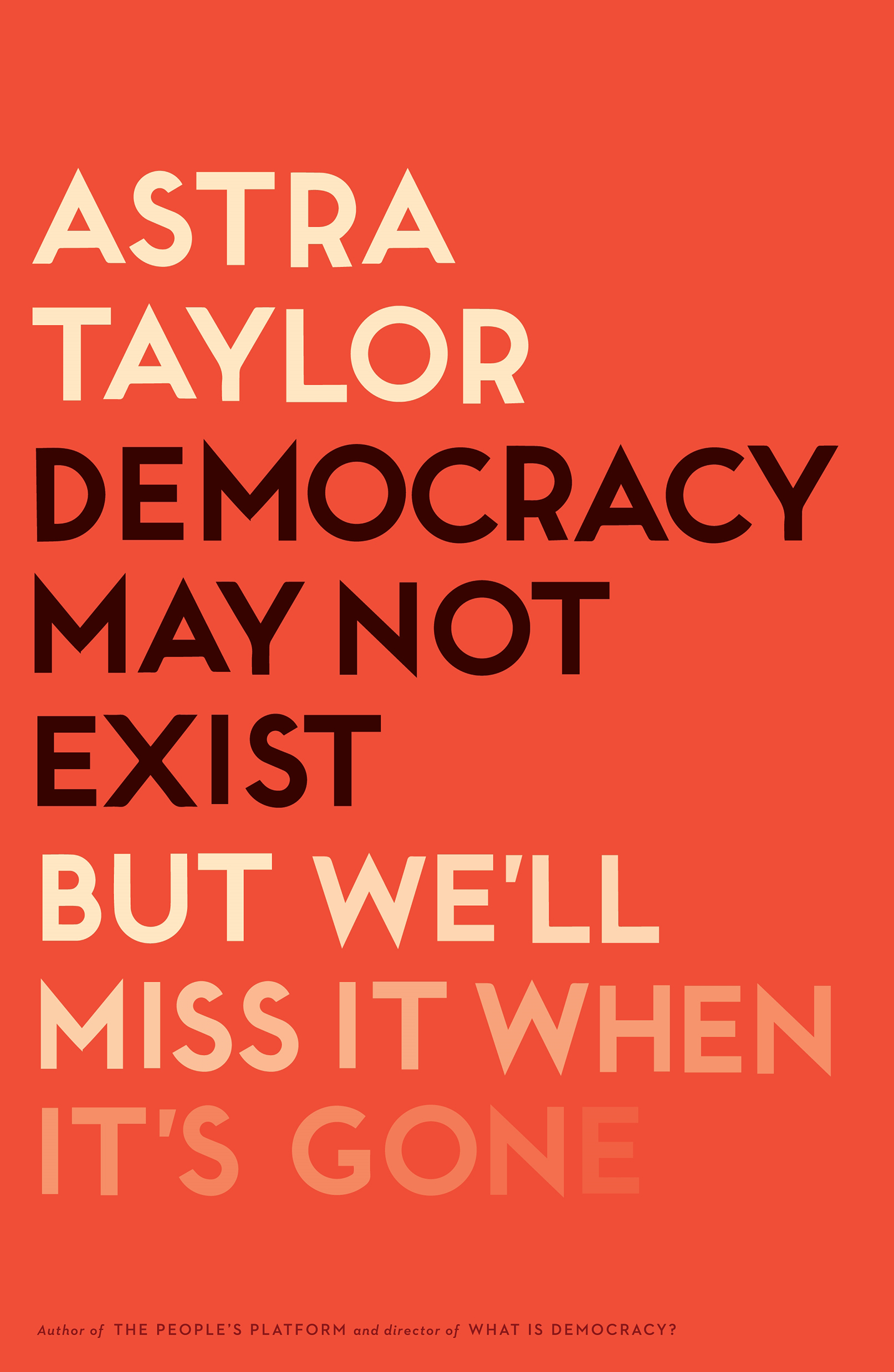The author and publisher have provided this e-book to you for your personal use only. You may not make this e-book publicly available in any way. Copyright infringement is against the law. If you believe the copy of this e-book you are reading infringes on the authors copyright, please notify the publisher at: us.macmillanusa.com/piracy.
WHAT IS DEMOCRACY? Since this deceptively simple question first came into my mind, I havent been able to shake it. We think we understand the word, but what are we really referring to when we talk about a system in which the people rule themselves?
The word democracy is all around us, invoked in almost every conceivable context: government, business, technology, education, and media. At the same time, its meaning, taken as self-evident, is rarely given much serious consideration. Though the headlines tell us democracy is in crisis, we dont have a clear conception of what it is that is at risk. The significance of the democratic ideal, as well as its practical substance, is surprisingly elusive.
For most of my life, the word democracy didnt hold much appeal. I was of course never against democracy per se, but words such as justice, equality, freedom, solidarity, socialism, and revolution resonated more deeply. Democracy struck me as mealy-mouthed, even debased. That idealistic anarchists and authoritarian leaders are equally inclined to claim democracy as their own only demonstrated its lack of depth. North Korea does, after all, call itself a Democratic Peoples Republic, and Iraq was invaded by the U.S. Army in the name of bringing democracy to the Middle East. But today I no longer see the opportunistic use of the word as a sign of the ideas vapidity. Those powers co-opt the concept of democracy because they realize that it represents a profound threat to the established order, a threat they desperately hope to contain.
After making a documentary film, What Is Democracy?, I now understand the concepts disorienting vagueness and protean character as a source of strength; I have come to accept, and even appreciate, that there is no single definition I can stand behind that feels unconditionally conclusive. Though the practice has extensive global roots, the word democracy comes to us from ancient Greece, and it conveys a seemingly simple idea: the people (demos) rule or hold power (kratos). Democracy is the promise of the people ruling, but a promise that can never be wholly fulfilled because its implications and scope keep changing. Over centuries our conceptions of democracy have expanded and evolved, with democracy becoming more inclusive and robust in many ways, yet who counts as the people, how they rule, and where they do so remain eternally up for debate. Democracy destabilizes its own legitimacy and purpose by design, subjecting its core components to continual examination and scrutiny.
Perfect democracy, Ive come to believe, may not in fact exist and never will, but that doesnt mean we cant make progress toward it, or that what there is of it cant disappear. For this reason, I am more convinced than ever that the questions of what democracy isand, more important, what it could beare ones we must perpetually ask.
Right now, many who question democracy do so out of disillusionment, fear, and outrage. Democracy may not exist, yet it still manages to disappoint. Political gridlock, corruption, unaccountable representatives, and the lack of meaningful alternatives incense people across the ideological spectrum; their anger simmers at dehumanizing bureaucracy, blatant hypocrisy, and lack of voice. Leaders are not accountable and voters rightly feel their choices are limited, all while the rich keep getting richer and regular people scramble to survive. In advanced democracies around the world, a growing number of people arent even bothering to votea right many people fought and died for fairly recently. Most Americans will say that they live in a democracy, but few will say that they trust the government, while the state generally inspires negative reactions, ranging from frustration to contempt and suspicion. The situation calls to mind Jean-Jacques Rousseaus observation from The Social Contract: In a well-ordered city every man flies to the assemblies; under a bad government no one cares to stir a step to get to them. As soon as any man says of the State What does it matter to me? the State may be given up for lost.
A cauldron of causes generates an atmosphere of corrosive cynicism, social fragmentation, and unease, with blame too often directed downward at the most vulnerable populations. And its not just in the United States. Consider the United Kingdom vote to leave the European Union, the decision known as Brexit; the resurgence of right-wing populism across Europe; coups and reactionary electoral victories in Brazil; and the rise of fascism in India. Platos warning about democracy devolving into tyranny rings chillingly prophetic. The promise of self-rule risks becoming not a promise but a curse, a self-destructive motor pushing toward destinations more volatile, divided, despotic, and mean.
But this book isnt about the pitfalls of popular sovereignty, though it certainly has its perils. Nor is it about the shortcomings of current liberal democratic political systems or the ways they have been corrupted by money and powerthough they have been. Thats a story that has been told before, and while it will be the backdrop to my inquiry it is not the focus. This book, instead, is an invitation to think about the word democracy from various angles, looking back through history and reflecting on the philosophy and practice of self-rule in hopes that a more contemplative view will shed useful light on our present predicament. My goal is not to negate the sense of alarm nor deter people from action but to remind us that we are part of a long, complex, and still-unfolding chronicle, whatever the days headlines might be or whoever governs the country.
Taking a more theoretical approach to democracys winding, thorny path and inherently paradoxical nature can also provide solace and reassurance. Ruling ourselves has never been straightforward and never will be. Ever vexing and unpredictable, democracy is a process that involves endless reassessment and renewal, not an endpoint we reach before taking a rest (leaving us with a finished system to tweak at the margins). As such, this book is my admittedly unorthodox, idiosyncratic call to democratize society from the bottom to the top. It is also an expression of my belief that we cannot rethink democracy if we havent really thought about it in the first place.
One thing Ive learned is that the people who are most averse to deepening democracy know exactly why they despise it (Plato, who helped invent political philosophy by railing against democracy, arguably began the trend.) A political science major told me that she doesnt value democracy much. The phrase that inspires me, she said, is the American dream and that ability to climb. Opportunity mattered to her and her friends more than inclusion. I expected them to see democracy and capitalism as mutually reinforcing; instead, they perceived the two to be at odds in key respects: democratic demands, whether for progressive taxation or for liberal immigration policies, would diminish their social and economic distinction.


